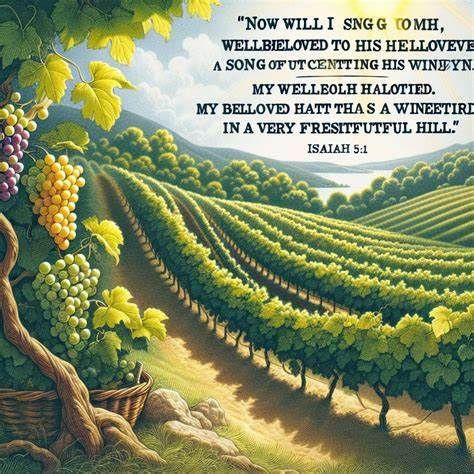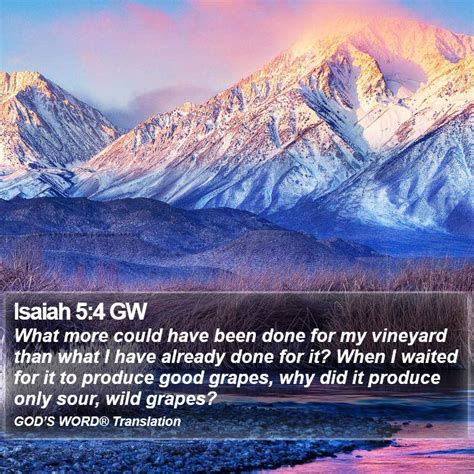Parable: The Song of the Vineyard
- Ken Kalis
- Oct 8, 2025
- 4 min read
Isaiah 5:1–7

O be careful little hands what you do, be careful little hands what you do!
For the Father up above is looking down in love, so be careful, little hands what you do!
It's the song of the Vineyard in my Mom's version.
Her expectation was like the Father's, that I would bring forth fruit!
Bearing the fruits of righteousness is God's expectation of His people. Read on!
Introduction
In our previous study, Nathan’s parable of the lamb confronted King David’*s (1085-1015 BC) hidden sin and brought him to repentance. This week, we move forward to another prophet and another parable—Isaiah’s “Song of the Vineyard.” Nathan’s story exposed one man’s guilt; Isaiah’s song laments the unfaithfulness of an entire nation. Both reveal the heart of God: a holy love that longs for righteousness but grieves over rebellion.
An asterisk*after a name means the person is in my book SPIRITUAL LIVES.
The Parable
Isaiah* (700s BC) begins, “I will sing for my beloved a song about His vineyard.” It sounds like a love song, but quickly turns to sorrow. The “beloved” is the Lord, and the vineyard is His people Israel.

“My well-beloved had a vineyard on a very fruitful hill.
He dug it, cleared it of stones, planted it with the choicest vine,
built a watchtower in it, and hewed out a winepress.
He looked for it to yield grapes, but it yielded wild grapes.” (Isa 5:1-2)
Every detail shows God’s careful care: the planting, the protecting, the preparing for fruit. Yet despite all His goodness, the vineyard produced only sour, worthless fruit.
Then comes the Lord’s question:
“What more could have been done for my vineyard that I have not done in it?” (v. 4)
It is the voice of a heartbroken God. Judgment follows: the hedge will be torn down, the vineyard trampled, and the rain withheld.
The Meaning of the Vineyard
Isaiah interprets the parable plainly:
“For the vineyard of the Lord of hosts is the house of Israel,
and the men of Judah His pleasant plant.
He looked for justice, but behold, bloodshed;
for righteousness, but behold, a cry of distress.” (v. 7)

Israel’s fruit was injustice, greed, and violence. God had planted His people to bear the sweet grapes of mercy and holiness, but they produced the wild fruit of sin. The vineyard that should have filled the world with joy became barren.
The Application
God still seeks fruit from His people today. Jesus* (4BC-30AD) said, “By this My Father is glorified, that you bear much fruit” (John 15:8). We are His vineyard now—planted in grace, watered by His Word, guarded by His Spirit. He looks for the fruit of love, peace, humility, and obedience.

Yet how often we resemble ancient Israel! The Lord lavishes care upon us, but our lives yield anxiety, pride, or neglect. When our hearts grow cold, God’s question echoes again: What more could I have done for you?
The Hope of Restoration
Though the song ends in judgment, Isaiah’s prophecy doesn’t stop there. Later chapters promise a Redeemer who will make the desert blossom and restore the vineyard in righteousness. The Lord never stops tending His garden. Even when He prunes or disciplines, it is to make us fruitful again.
Conclusion
Isaiah’s Song of the Vineyard reminds us that God expects fruit from His people. He has done everything necessary for us to thrive in His love. Let us not yield the wild grapes of worldliness, but the sweet fruit of a life surrendered to Christ.
Next week, we’ll hear Jesus pick up this same theme in the Parable of the Wicked Tenants—showing how God sent His own Son to seek fruit from His vineyard, and how the response of men revealed their hearts.
Prayer
Lord of the vineyard, You have planted us by grace and tended us with patience. Forgive the wild fruit of our lives, and by Your Spirit help us to bear the fruit that pleases You—love, joy, peace, and righteousness in Christ. Amen.
Questions for Reflection
What “fruit” is God cultivating in your life right now, and what hinders it from growing?
How does this parable help you understand both God’s justice and His mercy toward His people?
Please share your thoughts in the comments section.
************************************
Go work in the vineyard, ’tis Jesus commands,
Then why are we idle and folding our hands?
He speaks to the children and we must obey,
Go work in the vineyard, go labor today.
Refrain
Sow in the morning the seed of the Word,
Sow in the morning and trust in the Lord,
He of our labor a record will keep;
Life everlasting and joy we shall reap.
Go forth in the vineyard, how earnest the call,
There’s work for the children, there’s plenty for all:
Too precious the moments to squander away,
Go work in the vineyard, go labor today.
Refrain
Go work in the vineyard, how glad we should be
That Jesus is saying to you and to me,
The harvest is coming, arise! and away,
Go work in the vineyard, go labor today.
Refrain
Go forth at His bidding our places to fill,
Go forth at His bidding and work with a will;
Grieve not the dear Savior by longer delay,
Go work in the vineyard, go labor today.
Refrain
Fanny Crosby, 1881






Comments